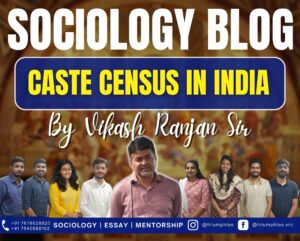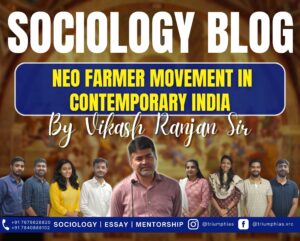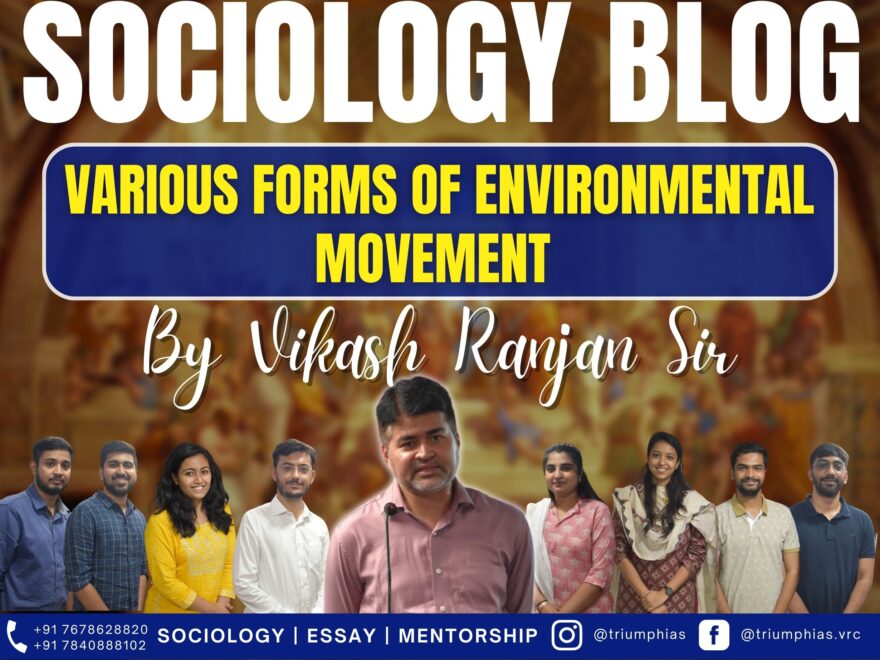Various forms of
Environmental Movement in India
(Relevant for Sociology Optional for Civil Services Examination)

Introduction
The environmental movement is a type of “social movement that involves an array of individuals, groups and coalitions perceive a common interest in environmental protection and act to bring about changes in environmental policies and practices”
Vandana Shiva authored Vedic Ecology where she combines feminism and ecological concerns. She argues that in Vedic period both women and nature were given respect. Neither environmental degradation nor women subjugation were part of Vedic culture. Prakariti referred to nature and feminine perspective.
Gadgil and Guha has divided Environmental Movement in India into 4 Parts:
- “Primitivist” Environmental Movement: Primitivist Environmental Movement involve Indigenous communities and their traditional ecological knowledge. These movements often focus on protecting their ancestral lands and resources from exploitation. An example is the Dongria Kondh tribe’s resistance against mining in Niyamgiri Hills. The tribe’s cultural practices and livelihoods are deeply intertwined with the local environment, driving their fight to prevent bauxite mining in the region.
- “Messianic” Environmental Movement: Messianic Environmental Movement are led by charismatic leaders who advocate radical change and a spiritual or moral vision for the environment. The Chipko movement, exemplified by Sunderlal Bahuguna, emphasized the sacredness of forests and the interconnectedness of all life forms. Bahuguna’s leadership galvanized people to protect trees, resisting deforestation and promoting ecological balance.
- “Gandhian” Environmental Movement: Gandhian Environmental Movement draw from Mahatma Gandhi’s principles of nonviolent resistance and self-reliance. The Narmada Bachao Andolan, led by Medha Patkar, protested against large dams on the Narmada River. Embracing Gandhian values, the movement advocated for the rights of displaced communities and sustainable development while opposing projects that could harm people and the environment.
- “State-Oriented” Environmental Movement: State-oriented Environmental Movement collaborate with governmental bodies to address environmental issues through policy and legal means. The Silent Valley movement sought to protect the Silent Valley National Park from a hydroelectric project. Environmentalists engaged with government agencies to highlight the ecological significance of the area, leading to policy changes that preserved the park’s biodiversity.
Factors leading to Environmental Movement:
- Displacement and Livelihoods: The displacement of marginalized communities due to large-scale development projects, often justified in the name of progress, triggers Environmental Movement. The loss of traditional livelihoods and access to natural resources leads to protests.
- Resource Conflicts and Equity: Unequal distribution of resources and benefits, along with issues of land ownership and access, fuel Environmental Movement. The concept of environmental justice, as highlighted Robert Bullard, underpins the idea that marginalized groups bear a disproportionate burden of environmental degradation.
- Cultural Identity and Ecology: Indigenous and local communities’ cultural identities are closely tied to their relationship with the environment. Environmental Movement often arise when these communities face threats to their traditional knowledge, practices, and cultural heritage. Vandana Shiva’s work emphasizes the connection between cultural diversity and ecological sustainability.
- Media and Awareness: Increased media coverage and communication channels have facilitated the spread of information about environmental issues. Manuel Castells’ theory of the “network society” highlights how modern communication technologies can amplify social movements by connecting geographically dispersed activists.
- Globalization and Environmental Movement Impact: Ulrich Beck’s notion of the “risk society” highlights how global risks, including environmental ones, transcend national boundaries and necessitate collective action. . He says that more people are beginning to realize that their fight for a share of the wealth cake is futile if the cake is poisoned as a result of pollution and environmental damage. Globalization’s effects on resource extraction, economic systems, and consumption patterns contribute to environmental degradation.
- Urbanization and Environmental Movement Concerns: Saskia Sassen’s perspective on global cities emphasizes the interconnectedness of urban centers and the environment .As urban populations grow, urban environmental issues such as pollution and waste management become more salient. The issues are presenting great challenge to country with increased urbanisation and increasing discontent aming people with rising pollution.
- Civil Society and Advocacy: The growth of civil society organizations and grassroots advocacy groups has provided platforms for collective action on environmental issues. Sociologist Alain Touraine’s concepts of social movements and the “subject of action” underscore the importance of collective agency in driving change.
- loss of Biodiversity and Ecosystems: The depletion of biodiversity and the destruction of ecosystems trigger movements aimed at conserving natural habitats. The Save Silent Valley movement aimed to protect the unique biodiversity of the Silent Valley National Park.
- Climate Change and Activism: Growing awareness of climate change has led to movements like Fridays for Future, inspired by Greta Thunberg. Young activists demand urgent action from governments to mitigate the impacts of climate change.
- Water Scarcity and Rights: Issues related to water scarcity and access have led to movements advocating for equitable distribution and sustainable management. Even polluted water causing problems for coastal communities’ whose livelihood depend on water resources. Similarly farmers are getting affected due to declining ground water level.
- Gadgil and Guha argue that “Indeed, the environmental policies in India are still colonial in nature and have no interest in the sustainable development of the larger ecosystem. The most of Indian poor and socially marginalised people are still dependent on the natural environment of their locality to meet their basic material needs, which referred to as ecosystem people. These ecosystem people have been largely exploited by biosphere people which are better-off urban dwellers in a colonial manner.
Conclusion
These factors illustrate the complexity of environmental Movement issues in India and the diversity of movements that have emerged in response. The interconnectedness of social, economic, and ecological concerns underscores the need for holistic approaches to environmental management and sustainability.
General Questions related to environmental movement :
-
What is the environmental movement?
-
Who is Vandana Shiva and what is her contribution to the environmental movement in India?
-
What are the key factors that lead to the emergence of environmental movement?
Types of Environmental Movement in India:
-
What is the “Primitivist” Environmental Movement? Can you provide an example?
-
How does the “Messianic” Environmental Movement differ from other types?
-
What are the principles behind the “Gandhian” Environmental Movement?
-
What is the role of the state in “State-Oriented” Environmental Movements?
Factors Leading to Environmental Movement:
-
How do displacement and livelihoods contribute to environmental movement?
-
What is environmental justice and how does it relate to resource conflicts and equity?
-
How does cultural identity impact the emergence of environmental movement?
-
What role does media and awareness play in promoting environmental movement?
-
What is the impact of globalization on environmental movement?
-
How do urbanization and environmental movement interact?
-
What role does civil society play in environmental advocacy?
-
Why is loss of biodiversity a trigger for environmental movement?
-
How has climate change activism evolved over time?
-
What issues related to water scarcity have led to the rise of environmental movement?
Theoretical Perspectives:
-
Can you explain Robert Bullard’s concept of environmental justice?
-
What does Manuel Castells mean by the “network society”?
-
How does Ulrich Beck’s notion of the “risk society” relate to environmental movement?
-
What is Alain Touraine’s concept of the “subject of action”?
Environmental Policy:
-
Why do Gadgil and Guha argue that environmental policies in India are colonial in nature?
-
What is the difference between “ecosystem people” and “biosphere people” as per Gadgil and Guha?
Conclusion:
-
Why is a holistic approach necessary for environmental management and sustainability in India?
-
What can individuals do to contribute to environmental sustainability?
Sample Questions for UPSC Sociology Optional Paper:
Paper I:
-
“Social movements are an important component of modern societies.” Discuss.
-
Explain the role of civil society organizations in promoting social change.
-
What is meant by “collective action”? How does it manifest in social movements?
-
Discuss the concept of “relative deprivation.” How can it lead to social movements?
Paper II:
-
Critically evaluate the contribution of M. N. Srinivas to the understanding of social change in India.
-
Discuss the role of NGOs in addressing environmental issues in India.
-
Evaluate the impact of globalization on marginalized communities in India.
-
Explain the relevance of Gandhian principles in contemporary social movements.
-
“Urbanization in India has led to the exploitation of natural resources.” Discuss.
-
Discuss the influence of social media on social movements in contemporary India.
-
Evaluate the role of women in environmental movement in India.
-
“The environmental movement in India is a result of cultural, economic, and social factors.” Elaborate.
Questions on Theorists:
-
How does Ulrich Beck’s “risk society” theory apply to environmental degradation in modern society?
-
Explain Manuel Castells’ concept of the “network society” in the context of environmental activism.
-
Discuss Robert Bullard’s notion of environmental justice in relation to marginalized communities.
Additional Questions:
-
Examine the importance of traditional ecological knowledge in environmental movement.
-
Discuss the concept of environmental ethics in the Indian context.
-
What is the role of youth activism, exemplified by Fridays for Future, in influencing government policies related to climate change?
-

To master these intricacies and fare well in the Sociology Optional Syllabus, aspiring sociologists might benefit from guidance by the Best Sociology Optional Teacher and participation in the Best Sociology Optional Coaching. These avenues provide comprehensive assistance, ensuring a solid understanding of sociology’s diverse methodologies and techniques.
META TAGS: Environmental Movement, forms of Environmental Movement, types of Environmental Movement, features of environmental movement in india, Environmental Movement pdf, environmental movement evs, an environmental movement, movements for environmental protection, what are the Environmental Movement in india, examples of Environmental Movement, causes of environmental movement, what are the major Environmental Movement, definition of environmental movement, Environmental Movement of india, different Environmental Movement in india, global Environmental Movement, global Environmental Movement pdf, history of environmental movement,
 |
 |
Explore Sociology Optional Syllabus
Paper-1
FUNDAMENTALS OF SOCIOLOGY
- Sociology – The Discipline
- Sociology as Science:
- Research Methods and Analysis:
- Sociological Thinkers:
- Karl Marx- Historical materialism, mode of production, alienation, class struggle.
- Emile Durkheim- Division of labour, social fact, suicide, religion and society.
- Max Weber- Social action, ideal types, authority, bureaucracy, protestant ethic and the spirit of capitalism.
- Talcott Parsons- Social system, pattern variables.
- Robert K. Merton- Latent and manifest functions, conformity and deviance, reference groups.
- Mead – Self and identity.
- Stratification and Mobility:
- Concepts- equality, inequality, hierarchy, exclusion, poverty and deprivation.
- Theories of social stratification- Structural functionalist theory, Marxist theory, Weberian theory.
- Dimensions – Social stratification of class, status groups, gender, ethnicity and race.
- Social mobility- open and closed systems, types of mobility, sources and causes of mobility.
- Works and Economic Life:
- Social organization of work in different types of society- slave society, feudal society, industrial /capitalist society
- Formal and informal organization of work.
- Labour and society.
- Politics and Society:
- Sociological theories of power.
- Power elite, bureaucracy, pressure groups, and political parties.
- Nation, state, citizenship, democracy, civil society, ideology.
- Protest, agitation, social movements, collective action, revolution.
- Religion and Society:
- Sociological theories of religion.
- Types of religious practices: animism, monism, pluralism, sects, cults.
- Religion in modern society: religion and science, secularization, religious revivalism, fundamentalism.
- Systems of Kinship:
- Family, household, marriage.
- Types and forms of family.
- Lineage and descent.
- Patriarchy and sexual division of labour.
- Contemporary trends.
- Social Change in Modern Society:
- Sociological theories of social change.
- Development and dependency.
- Agents of social change.
- Education and social change.
- Science, technology and social change.
Paper-2
INDIAN SOCIETY: STRUCTURE AND CHANGE
INTRODUCING INDIAN SOCIETY
- Perspectives on the study of Indian society:
- Indology (GS. Ghurye).
- Structural functionalism (M N Srinivas).
- Marxist sociology (A R Desai).
- Impact of colonial rule on Indian society :
- Social background of Indian nationalism.
- Modernization of Indian tradition.
- Protests and movements during the colonial period.
- Social reforms.
SOCIAL STRUCTURE
- Perspectives on the study of Indian society:
- The idea of Indian village and village studies.
- Agrarian social structure – evolution of land tenure system, land reforms.
- Caste System:
- Perspectives on the study of caste systems: GS Ghurye, M N Srinivas, Louis Dumont, Andre Beteille.
- Features of caste system.
- Untouchability – forms and perspectives.
- Tribal communities in India
- Definitional problems.
- Geographical spread.
- Colonial policies and tribes.
- Issues of integration and autonomy.
- Social Classes in India:
-
- Agrarian class structure.
-
-
- Industrial class structure.
- Middle classes in India.
-
- Systems of Kinship in India:
- Lineage and descent in India.
- Types of kinship systems.
- Family and marriage in India.
- Household dimensions of the family.
- Patriarchy, entitlements and sexual division of labour
- Religion and Society:
- Religious communities in India.
- Problems of religious minorities.
- Patriarchy, entitlements and sexual division of labour
SOCIAL CHANGES IN INDIA
- Visions of Social Change in India:
- Idea of development planning and mixed economy
- Constitution, law and social change.
- Education and social change.
- Rural and Agrarian transformation in India:
- Programmes of rural development, Community Development Programme, cooperatives,poverty alleviation schemes
- Green revolution and social change.
- Changing modes of production in Indian agriculture.
- Problems of rural labour, bondage, migration.
3. Industrialization and Urbanisation in India:
-
- Evolution of modern industry in India.
- Growth of urban settlements in India.
- Working class: structure, growth, class mobilization.
- Informal sector, child labour
- Slums and deprivation in urban areas.
4. Politics and Society:
-
- Nation, democracy and citizenship.
- Political parties, pressure groups , social and political elite
- Regionalism and decentralization of power.
- Secularization
5. Social Movements in Modern India:
-
- Peasants and farmers movements.
- Women’s movement.
- Backward classes & Dalit movement.
- Environmental movements.
- Ethnicity and Identity movements.
6. Population Dynamics:
-
- Population size, growth, composition and distribution
- Components of population growth: birth, death, migration.
- Population policy and family planning.
- Emerging issues: ageing, sex ratios, child and infant mortality, reproductive health.
7. Challenges of Social Transformation:
-
- Crisis of development: displacement, environmental problems and sustainability
- Poverty, deprivation and inequalities.
- Violence against women.
- Caste conflicts.
- Ethnic conflicts, communalism, religious revivalism.
- Illiteracy and disparities in education.
Why Vikash Ranjan’s Classes for Sociology?
Proper guidance and assistance are required to learn the skill of interlinking current happenings with the conventional topics. VIKASH RANJAN SIR at TRIUMPH IAS guides students according to the Recent Trends of UPSC, making him the Best Sociology Teacher for Sociology Optional UPSC.
At Triumph IAS, the Best Sociology Optional Coaching platform, we not only provide the best study material and applied classes for Sociology for IAS but also conduct regular assignments and class tests to assess candidates’ writing skills and understanding of the subject.
Choose The Best Sociology Optional Teacher for IAS Preparation?
At the beginning of the journey for Civil Services Examination preparation, many students face a pivotal decision – selecting their optional subject. Questions such as “which optional subject is the best?” and “which optional subject is the most scoring?” frequently come to mind. Choosing the right optional subject, like choosing the best sociology optional teacher, is a subjective yet vital step that requires a thoughtful decision based on facts. A misstep in this crucial decision can indeed prove disastrous.
Ever since the exam pattern was revamped in 2013, the UPSC has eliminated the need for a second optional subject. Now, candidates have to choose only one optional subject for the UPSC Mains, which has two papers of 250 marks each. One of the compelling choices for many has been the sociology optional. However, it’s strongly advised to decide on your optional subject for mains well ahead of time to get sufficient time to complete the syllabus. After all, most students score similarly in General Studies Papers; it’s the score in the optional subject & essay that contributes significantly to the final selection.
“A sound strategy does not rely solely on the popular
Opinion of toppers or famous YouTubers cum teachers.”
It requires understanding one’s ability, interest, and the relevance of the subject, not just for the exam but also for life in general. Hence, when selecting the best sociology teacher, one must consider the usefulness of sociology optional coaching in General Studies, Essay, and Personality Test.
The choice of the optional subject should be based on objective criteria, such as the nature, scope, and size of the syllabus, uniformity and stability in the question pattern, relevance of the syllabic content in daily life in society, and the availability of study material and guidance. For example, choosing the best sociology optional coaching can ensure access to top-quality study materials and experienced teachers. Always remember, the approach of the UPSC optional subject differs from your academic studies of subjects. Therefore, before settling for sociology optional, you need to analyze the syllabus, previous years’ pattern, subject requirements (be it ideal, visionary, numerical, conceptual theoretical), and your comfort level with the subject.
This decision marks a critical point in your UPSC – CSE journey, potentially determining your success in a career in IAS/Civil Services. Therefore, it’s crucial to choose wisely, whether it’s the optional subject or the best sociology optional teacher. Always base your decision on accurate facts, and never let your emotional biases guide your choices. After all, the search for the best sociology optional coaching is about finding the perfect fit for your unique academic needs and aspirations.
Follow us :
🔎 https://www.instagram.com/triumphias
🔎https://www.youtube.com/c/TriumphIAS
https://t.me/VikashRanjanSociology
Find More Blogs
|
Scope of the subject and comparison with other social sciences |
|||
|
|
|
|
Modernity and social changes in Europe |




2 comments